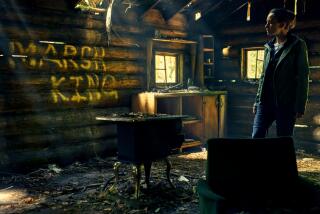Review: Australian drama ‘Dirt Music’ looks great, lacks depth
- Share via
The first 30 minutes or so of “Dirt Music” are a mysterious thrill. Scottish actress Kelly Macdonald is Georgie, the younger girlfriend of well-known local fisherman Jim (David Wenham) on the coast of Western Australia. She has a penchant for predawn ocean swims, morning wine and afternoon naps. Mostly ignored and judged by Jim, she casts her eye toward a poacher, Lu (Garrett Hedlund), she spots in the bay in the early mornings. Both Macdonald and Hedlund are bronzed, sinewy and at the peak of sun-drenched beauty. When they fall into bed after some doublespeak about “buying a beer,” it’s tremendously exciting.
But then the film stalls out in a rotation of meaningful looks and tearful whispers and gazing at ocean vistas. Lu has a recently tragic past, and the memories of his loss haunt him, audibly, and visibly, nearly constantly, in visions of his brother, sister-in-law and niece singing bluegrass music in their family band. In their small town, Lu and Jim are bound by Georgie, but also by slowly revealed layers of tragedy. When it all becomes too much, Lu takes off for a remote island, running away from his past, his memories, from Georgie and Jim, into a punishing wilderness.
And there’s so much potential in director Gregor Jordan’s film. First, there’s the source material, Tim Winton’s Booker Prize-shortlisted 2002 novel of the same name. (It was awarded the highest accolade for Australian literature, the Miles Franklin Award, and was adapted by experienced screenwriter Jack Thorne.) Then there are the two vastly underrated and enormously talented stars, Macdonald and American actor Hedlund. There’s the stunning setting, on the coast of Western Australia, near Perth, captured gorgeously by cinematographer Sam Chiplin (with underwater photography by Rick Rifici).
At first, there’s a certain charm to the rather taciturn script, in which the characters talk around rather than to one another. Georgie and Jim are never direct, so when she meets Lu and he’s rather forthright, it’s a refreshing change of pace, even though Georgie still struggles to be upfront. In fact, much of the issue with the film is that Georgie is not an easy character to get inside. She’s self-destructive with sex and booze; her main coping mechanism is plunging into bodies of water. But she rarely says exactly what she’s thinking. Or when she does, it seems too little too late. The script is frustratingly abstruse at times.
It’s an incredibly beautiful film, and undeniably captures the breathtaking and unique landscape of coastal Western Australia, but it’s a challenge to emotionally connect to it. It feels like the outline of what would have been an epic novel, but in the translation to the screen, it has lost its interiority and anything profound it might have communicated. In 2009, Australian filmmaker Phillip Noyce (“Rabbit-Proof Fence”) was attached to adapt the novel, but by 2014, he admitted in an interview, “I could never get a script that I thought captured the poetry of the novel, and there’s the problem. A poetic novel is just difficult to translate into a movie.” There’s something deeply lacking about this screen version of “Dirt Music,” and ultimately, all that potential is sadly squandered.
Katie Walsh is a Tribune News Service film critic.
‘Dirt Music'
Not rated
Running time: 1 hour, 45 minutes.
Playing: Available July 17 on demand and digital
More to Read
Only good movies
Get the Indie Focus newsletter, Mark Olsen's weekly guide to the world of cinema.
You may occasionally receive promotional content from the Los Angeles Times.










